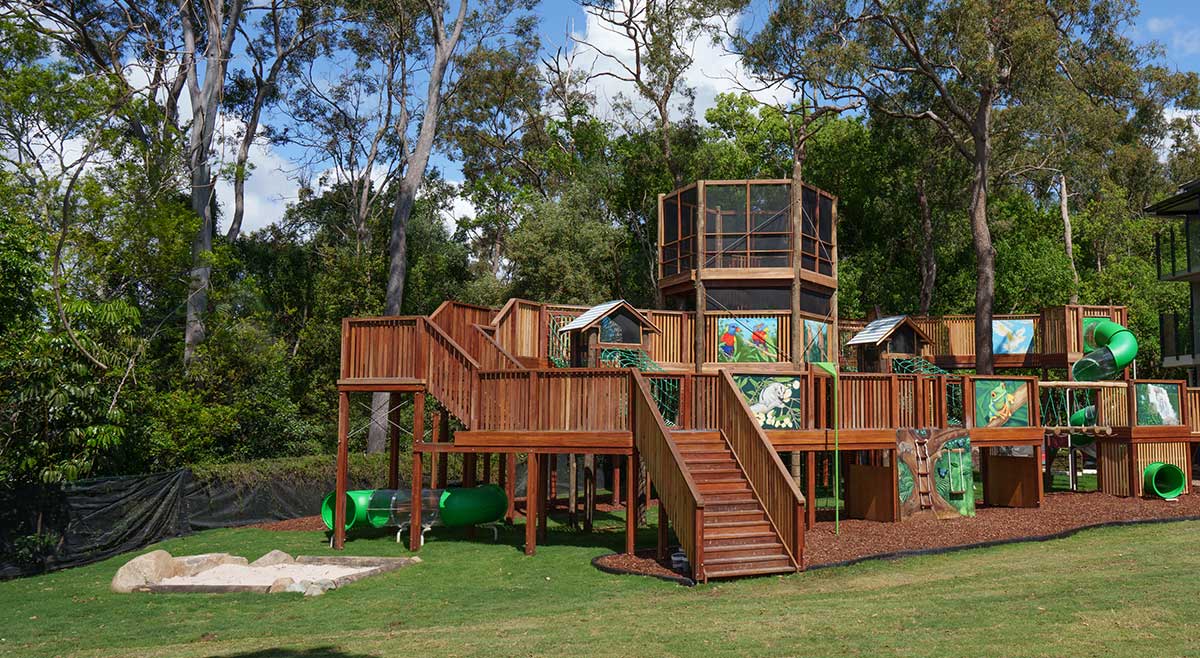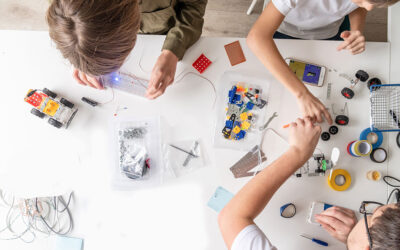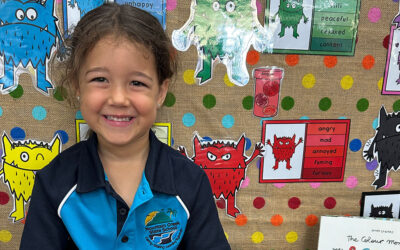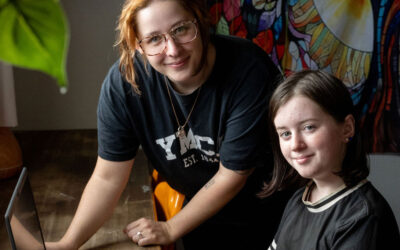An average of 1 in 10 children in Australia will have Language Disorder. For some, this comes as a comorbidity with something such as autism or hearing impairment. However, for 1 in 14 it is their only barrier to learning.
Mark Yeowell, CEO at Language Disorder Australia says that despite the prevalence being far higher than autism — something that affects 1 in 70 Australians — Language Disorder in children is often undiagnosed or misdiagnosed.
“Because Language Disorder doesn’t have the visibility of a physical disability, it often goes unnoticed. People assume that the child simply doesn’t have the ability or capacity, or they’re slow to learn to communicate,” says Mark.
This lack of diagnosis means that children aren’t getting the support they need, and they aren’t able to achieve their full potential.
What is Language Disorder?
Language Disorder is a communication disorder that can affect children. They have trouble understanding and speaking language, and may struggle with spoken language, written language, or both.
“For most, it is not an intellectual impairment. It’s predominantly around a child’s ability to take on-board and process language, and then being able to express themselves and respond to what they’ve heard,” says Mark.
Symptoms of Language Disorder include:
- trouble learning and using spoken and written language
- difficulty with vocabulary, sentence structure or having a conversation
- mixing up words within sentences
- having a hard time following directions or organising thoughts
- using short, simple sentences
What can be done to help a child with Language Disorder?
Once diagnosed, it takes a particular understanding and adjusted approach to learning. Most young people will also have the support of speech therapists and occupational therapists. With the right support and education provision, there’s no reason why kids with Language Disorder can’t go on to do great things.
As the peak body for representing and supporting young people with Language Disorder, not-for-profit Language Disorder Australia provides a number of programs to support children to achieve their full potential.
1. Specialist education at Mancel College
Previously named the Glenleighden School, this specialist Prep to Year 12 school based in Fig Tree Pocket has recently rebranded to be Mancel College. Operated by Language Disorder Australia, therapists work alongside specialist teachers to utilise their clinical expertise, skills and knowledge in evidence-based practice to identify and address student barriers to learning.
“Within the school context, we combine teachers and allied health staff in those spaces, such as speech therapists, occupational therapists, psychologists, physiotherapists, music therapists. And we make sure they work closely together to deliver outstanding curriculum outcomes for children and young people with Language Disorder,” says Mark.
In classes of approximately 12, students access the Australian Curriculum through meaningful inquiry related to their experiences and interests. They also have the opportunity to take part in certificate courses including Hospitality, Workplace Skills, Vocational Pathways and Agrifoods.
Mancel College is the only school in the Southern Hemisphere that provides support and education for children and young people with Language Disorder.
The campus is currently going through a $40-$50-million rebuild with a seven-stage masterplan in place. This upgrade will both significantly expand the number of students at the school. And also the range of programs and offerings that the school has, both in the curriculum and co-curricular space.
“Stage one has recently completed. We’ll move immediately into the second stage in the latter part of 2022.”
This will take the school’s capacity from its original 90 students to between 250 and 300 within the next two to three years.
Part of this rebuild means a brand-new adventure playground! Designed for students from 5 years old through to 18 years old, it offers a whole range of opportunities to be physical and active across three huge levels. It is accessible in many different ways and features a big spiral slide in the centre.

The College rebrand also comes with the appointment of a new principal Peter Foster.
“Peter is joining us from a position of great experience. Peter previously was the headmaster of John Paul College and he’s just finished at Hymba Yumba, which is Australia’s highest achieving First Nations school. It’s just won the award for most innovative independent secondary school in Australia. So we’re really pleased to have Peter on board, he’s a very well-respected, experienced educator, and he’s very passionate about what we’re doing as an organisation,” says Mark.
2. Supporting children in the mainstream setting
Support services are also available to every school in Queensland through the Language Disorder Australia schools services program.
“Working with State, Catholic and Independent schools across Queensland, our specialist multidisciplinary teams support school staff to develop individualised approaches to support their students with Language Disorder.” says Mark.
Language Disorder Australia has approximately 20 people who work in that space and travel around Queensland visiting schools. They do assessments of students with Language Disorder in the mainstream system. And they then provide plans and support. There is an upskilling of teachers within schools to help them to be able to support children and young people with Language Disorders so that they can cope in the mainstream setting.
“As an organisation, we’re committed to inclusion. We actually want as many young people as possible to stay in the mainstream. Mancel College is about meeting the needs of those for whom the mainstream isn’t working. And often that’s because the system isn’t geared up to provide the right support for them.
With the outreach program, many children with Language Disorder can and are successful in mainstream schooling, they don’t need to be in a specialist school.
“For some students Mancel College is a short term. Students will come for two or three years and get enough support to enable them to return.
We’re always really excited when a child leaves us and goes back to a mainstream school,” says Mark.
The School Support Service is fully funded through the Queensland Government, there is no cost for any school in Queensland.
3. At a Bright Door clinic
The third arm of accessible services for children with Language Disorder is the Bright Door clinics.
With multidisciplinary services under one roof, the Bright Door team works collaboratively to provide high-quality, integrated services that address all aspects of life.
Here you can access speech language pathology, occupational therapy, psychology and counselling, music therapy and physiotherapy for children and young people with Language Disorder and other developmental disorders. Therapy services include:
- Comprehensive assessment
- Individual therapy
- Holiday programs
- NDIS reporting
- Telehealth

I think my child might have Language Disorder, what do I do?
Mark says that it is important for parents to reach out to Language Disorder Australia as soon as they feel there is a concern.
“It may be that we can help them through the clinic. It may be we can help their child in the mainstream through the outreach, it could be the school.
“Language Disorder is a condition, and if a child is struggling in that space, we’re here to help. We’re absolutely committed to great outcomes, quality education is at the bedrock of what we’re wanting to do. If people need our support and our services, we will do all we can to help their child to achieve amazing things and it not to be a barrier to their success in life,” says Mark.
“We’re seeing greater success in recent years. As more opportunities are provided through the school we can see better outcomes for young people.”
On the flip side, we know also the risks of not doing anything. Young people with Language Disorder have a higher risk of mental health issues, of depression and suicide. Sadly, these kids have a higher risk of getting caught up in the juvenile justice system. Around 60% of young people in juvenile detention have Language Disorder. That’s disproportionate, and that tells us something about where things are not being recognised, supported, and needs met early on.”
For families who may feel that Mancel College might be for them, the school holds regular Tour and Explore sessions. The next is on October 19, 2022. This is an opportunity to hear more about the school, see the facilities, and learn more about the programs on offer. Book your place via the Mancel College website.
Keep Reading
Signs your child isn’t coping with formal schooling
Parenting a highly sensitive child: This is what you need to know


